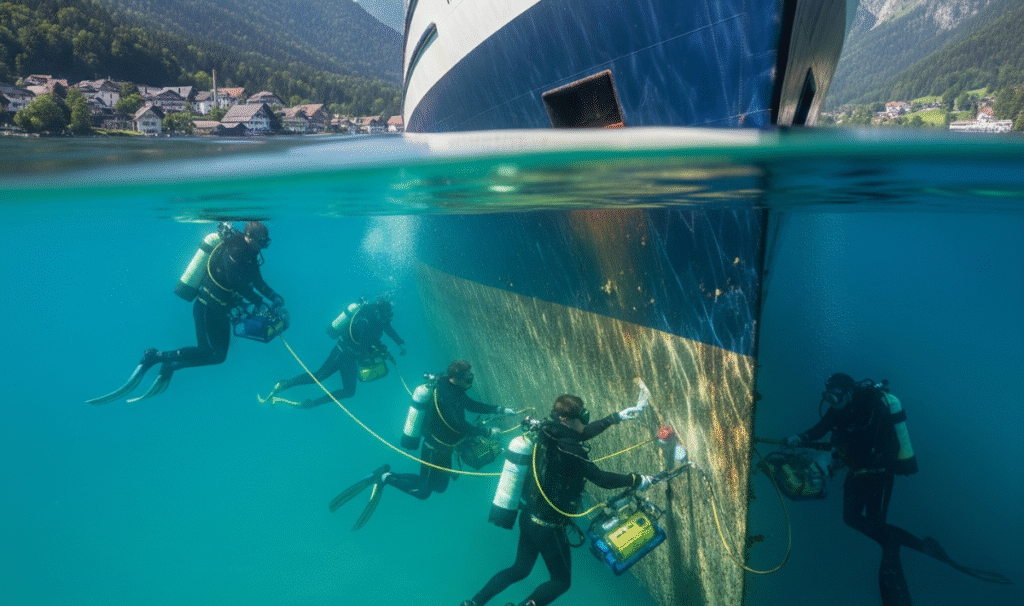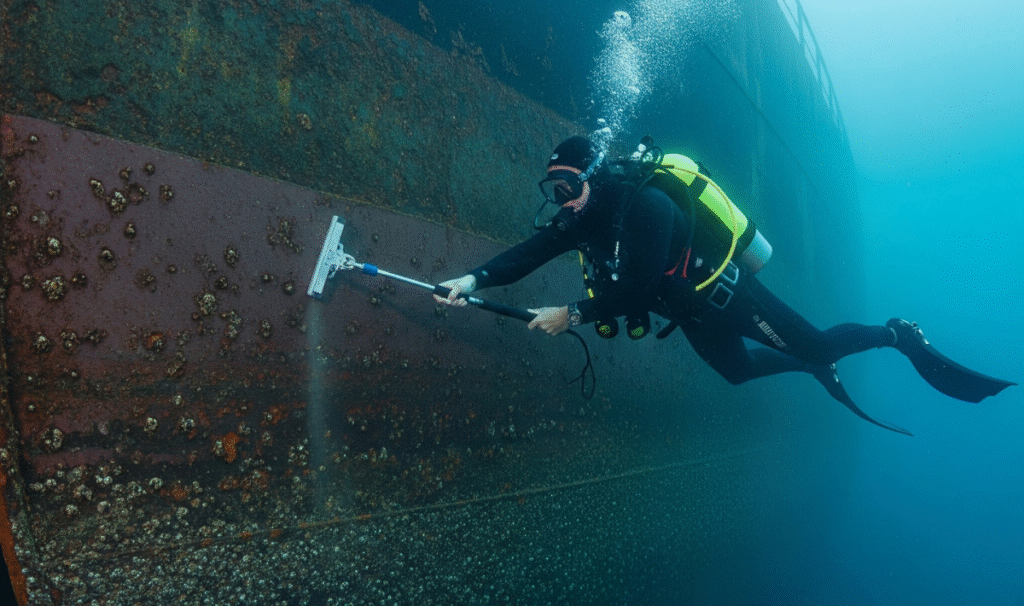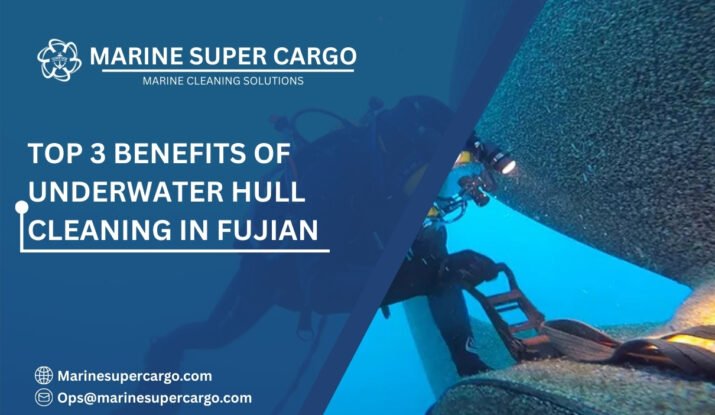Most people imagine ships as titans of the sea, gliding with powerful engines and impeccable strength. But the truth is, even the strongest vessel can be slowed down by something as small as algae. The real culprits that silently sabotage marine performance are barnacles, moss, and stubborn seaweed clinging to a ship’s hull.
That’s why underwater hull cleaning in Fujian has become more than just routine maintenance—it’s a cornerstone of modern shipping success. Fujian, one of China’s key maritime gateways, is a hub where fleets from around the world converge. With cleaner hulls, ships move smoothly, burn less fuel, and stay compliant with global marine regulations.
What is Underwater Ship Hull Cleaning?
The Process Explained
Hull cleaning is like giving a ship a much-needed scrub bath. Skilled divers or robotic devices go underwater, removing the biofouling organisms that weigh ships down. These include barnacles, algae, slime films, and even tiny crustaceans. By restoring the hull’s smoothness, underwater hull cleaning in Fujian effectively turns resistant drag into effortless gliding.
Why Fujian is a Strategic Hub for Hull Maintenance
Fujian’s ports aren’t only busy—they’re vital for domestic and international trade. Situated along China’s southeast coast, they handle cargo that powers global supply chains. Ships that pass through these waters encounter varying temperatures and nutrient-rich seas, which support marine growth. That’s why Fujian is particularly suited—and crucial—for effective underwater maintenance.

Improved Fuel Efficiency and Vessel Performance
How Fouling Causes Drag
A hull covered in marine growth is like an athlete running through mud. It forces engines to push harder, guzzling more fuel for less speed. The International Maritime Organization (imo.org) notes that even minimal surface fouling can increase fuel use by 10%.
Immediate Impact of Regular Cleaning
Once underwater hull cleaning in Fujian is done, captains often notice quicker speeds, smoother maneuverability, and reduced vibration. The ship feels more “alive,” cutting through waves instead of dragging against them.
Cleaner Oceans and Stronger Compliance
Reducing Biofouling and Invasive Species
Beyond fuel costs is a larger concern—the environment. Invasive species often hitch rides on fouled ship hulls, invading fragile ecosystems when vessels dock in new regions. By sticking to underwater hull cleaning in Fujian, ships minimize the spread of harmful organisms. This reduces ecological imbalance and protects biodiversity.
Meeting International Maritime Standards
The MARPOL Convention is clear: maintenance plays a pivotal role in reducing pollution. Ports under the guidance of organizations like iaphworldports.org and imca-int.com emphasize compliance for every vessel. Failing to maintain clean hulls could result in denied port entries, financial penalties, or reputational damage. Ships choosing underwater hull cleaning in Fujian stay on the right side of regulations while supporting global green efforts.
Lower Costs and Longer Ship Life
Protecting the Hull from Corrosion
Marine buildup traps moisture and accelerates corrosion. Over time, this can weaken a vessel and lead to expensive repairs or early retirement. Regular underwater hull cleaning in Fujian acts like a protective shield, preserving coatings and safeguarding the vessel’s steel structure.
Extending Coating and Paint Longevity
A clean hull means anti-fouling paints last longer. This reduces how often ships need repainting, saving both time and money. Operators also gain predictability in maintenance schedules, making planning smoother and financially sustainable.
The Shipping Industry’s Shift Toward Green Operations
Hull Cleaning as Part of Carbon Reduction Initiatives
Climate strategies now dominate maritime discussions. Fuel efficiency isn’t just about saving money—it’s about cutting carbon footprints. According to cleanship.co, Regular professional hull cleaning helps vessels align with eco-friendly goals by reducing emissions generated from extra fuel burn.
Fujian as a Regional Champion
Fujian has embraced sustainable port practices, positioning itself as a leader in regional green shipping. That’s why underwater hull cleaning in Fujian has become not just a convenience but a badge of environmental responsibility.
Best Practices for Underwater Hull Cleaning in Fujian
Certified Divers and Proper Equipment
Workmanship matters. Not every cleaning service offers world-class quality. Fujian-based divers and technicians often follow international cleaning standards recommended by organizations like imca-int.com. Choosing the right team ensures safety, compliance, and consistency.
Integrating Cleaning with Dry-Dock Inspections
Smart ship operators combine underwater hull cleaning in Fujian with inspections of propellers, rudders, and thrusters. This creates an all-in-one solution: performance optimization and early detection of potential damage.

Challenges and Considerations in Fujian Waters
Weather, Marine Growth, and Timing
Conditions in Fujian can shift quickly—from warm, growth-friendly seas in summer to turbulent weather during storm seasons. Timing cleanings strategically ensures less downtime and longer-lasting results.
Balancing Efficiency with Environmental Care
Eco-friendly cleaning solutions prevent toxic residues from leaking into water. Service providers in Fujian are increasingly adopting sustainable techniques to strike this delicate balance.
Conclusion
Shipping is the heartbeat of global commerce, and Fujian sits at its crossroads. Yet even the mightiest ship needs protection from tiny, relentless marine organisms. The three key benefits of underwater hull cleaning in Fujian—better efficiency, stronger environmental compliance, and reduced long-term costs—prove why this practice is essential.
Ships that undergo regular cleaning don’t just survive—they thrive. With smoother hulls, greener journeys, and fewer surprise repairs, vessels can look ahead confidently to longer, more profitable voyages.
FAQ:
Q1. How often should underwater hull cleaning in Fujian be done?
Most ships benefit from cleaning every 6–12 months, depending on routes and seasonal biofouling intensity.
Q2. Does cleaning damage the hull’s paint or coating?
When performed professionally with approved tools, cleaning preserves coatings rather than damaging them.
Q3. Is underwater hull cleaning environmentally safe?
Yes—eco-conscious methods are increasingly used in Fujian, aligned with IMO guidelines to protect marine ecosystems.
Q4. Can regular hull cleaning extend a ship’s lifespan?
Absolutely. By reducing corrosion and fouling damage, hull cleaning directly contributes to ship longevity and reduces costly structural repairs.
Q5. Why is Fujian becoming a preferred location for hull cleaning?
Its strategic geographic location, bustling maritime activity, and adoption of green port initiatives, underwater hull cleaning in Fujian both effective and future-forward.


